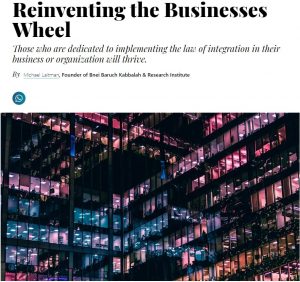
The global economy needs an intensive care unit. And just as no medicine is yet available to prevent or tackle the spread of the coronavirus, no cure for the precarious health of businesses and industries is at hand either. Soaring unemployment and a foreboding economic forecast pose great challenges for America and the rest of the world.
Every day it becomes more and more clear that something new is taking place before our eyes that will markedly change our attitude toward life, business, family, ourselves and the world. If we stop clinging to the past and welcome the global process we are going through with open-minds, we will be able to go through the labor pains of the birth of a new world with relative ease.
Throughout history, socio-economic structures have been altered many times: from tribal society in ancient times, to slavery and feudalism, to capitalism and communism, for example. We are now entering a new configuration that will be completely different from all its predecessors because it will be built on new principles in human relations.
As early as last century, the butterfly effect and other models of dynamic complex systems began to illustrate how interrelated, interdependent we are. Until now, we have been unable to internalize the significance of this interdependence, but our experience with the pandemic and its consequences has left us with no choice but to build social, political, industrial, economic structures with renewed vision.
The coronavirus indicates to us that, whether we want it or not, we must accept this change because without it we have no future.
Michael Laitman
As the pandemic came to bluntly remind us, we will all need to be closer to one another, to recognize that the world we live in is integrally rounded. We can move on to our next stage in the evolution of humanity gently, comfortably and quickly, through a clearer understanding of what needs to be done and where we should be headed. There is no need to wait for direction from additional painful blows.
Looking back, we appeared to be happy and content with life on the surface because we were used to what we had built and there was no incentive to change. However, it turned out that life has its own dynamic rhythm that didn’t stop to check our preferences. Today, we are in a transition period where we must change as human beings, which will have implications for the business world too.
First of all, we have to realize that we are living in a new era that requires a fundamental transformation. The coronavirus indicates to us that, whether we want it or not, we must accept this change because without it we have no future.
It is also important to understand that the necessity for change clearly comes from nature and not from any government or financial group. Nature is smarter and stronger than all of us. If we want to survive, we will need to understand where evolution is leading us—toward integration and mutual consideration.
No More Spinning the Wheels
Nature is drawing us into harmony with the integral world because integration is the highest law of nature, the supreme principle. One single force operates throughout the entire natural system and all reality is managed by it, directing us toward unity between ourselves and nature.
The crucial change that nature demands is that we organize a society whose internal impetus and driving force is altruism and concern for others, rather than maverick egoism. In other words, the required transformation does not focus directly on businesses and industries. Its target is the inner transformation of the person, a new perspective and kind of interaction at the interpersonal level.
Although organizations are now working to consolidate their labor force, a fundamentally different type of consolidation needs to take place in the new integral view. Until now, the success of an organization, business or team has been defined by values of egoistic competition: “We” gather to outdo the competition—a vision based in a “we” and “them” mentality.
In the integral view of the new reality we have entered, we are all one organism called humanity and we aim at being the best at what we do for the good of the others, not to inflate our pocketbooks. We work with the goal of benefiting everyone, and this is what guides us in every step. If, for example, we find out that someone else is doing the same thing better than we are, we will not try to destroy that person; on the contrary, we will provide full support.
An integral vision raises the bar from limited individual benefit to the benefit of the entire system. The new rules of competition stipulate that only those parts of the system that are truly essential and beneficial to the whole should remain active.
Implementing the integration law in businesses involves learning and training. Owners, managers and employees, all need to learn how to work together smoothly as essential components of one system. To do this, all must learn about the law of integration, where they come from, what they include, what they require from us, why we must keep them, and what we will gain from it—the successes it can individually and collectively bring us.
Those who are dedicated to implementing the law of integration in their business or organization will thrive. The warmer, and more considerate and supportive our relationships become, the greater our business success will be. This is the new business wheel that will make the world go round.
Featured in Thrive Global, Medium, LinkedIn, KabNet, Facebook